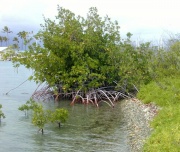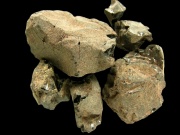Difference between revisions of "Mangrove"
m (Text replace - "== Authority ==" to "== Sources Checked for Data in Record ==") |
|||
| (3 intermediate revisions by 2 users not shown) | |||
| Line 1: | Line 1: | ||
| − | [[File:Rhizophorayngtreevt.jpg|thumb|Mangrove | + | [[File:Rhizophorayngtreevt.jpg|thumb|Mangrove ''Rhizophora mangle'']] |
| − | |||
| − | ''Rhizophora mangle'']] | ||
== Description == | == Description == | ||
| − | Any of several trees or shrubs of the genus ''Rhizophora'' such as Rhizophora mangle, Ceriops tagal, or Ceriops candolleana. The wood from mangrove trees is primarily used for making charcoal. The bark and leaves are high in tannins (10 to 40%) and are used in preparing leather and dying cloth. Mangrove bark contains a tannin that is low in acids and insoluble residues. However, used by itself, it produces a reddish color leather that is harsh and stiff. Thus, it is usually mixed with other tannins such as [ | + | Any of several trees or shrubs of the genus ''Rhizophora'' such as Rhizophora mangle, Ceriops tagal, or Ceriops candolleana. The wood from mangrove trees is primarily used for making [[charcoal]]. The bark and leaves are high in tannins (10 to 40%) and are used in preparing leather and dying cloth. Mangrove bark contains a [[tannin]] that is low in acids and insoluble residues. However, used by itself, it produces a reddish color [[leather]] that is harsh and stiff. Thus, it is usually mixed with other tannins such as [[wattle%20bark|wattle]] or [[quebracho|quebracho]]. Mangrove bark is often but incorrectly referred to as [[Cutch (wood)|cutch]] or kutch (Roberts and Etherington 1982). |
[[File:08 Bruguiera Extract_pieces.jpg|thumb|Bruguiera extract]] | [[File:08 Bruguiera Extract_pieces.jpg|thumb|Bruguiera extract]] | ||
| Line 10: | Line 8: | ||
''Rhizophora mangle; Ceriops tagal; Ceriops candolleana''; Natural brown 3:1; manglar (Esp.); Mangrove (Deut., Ned.); palétuvier rouge (Fr.); namorzyny (Pol.); manguezal, mangue vermelho (Port.); mangrovník (Slov.); mangrove cutch; baku baku; red mangrove; soga jambal | ''Rhizophora mangle; Ceriops tagal; Ceriops candolleana''; Natural brown 3:1; manglar (Esp.); Mangrove (Deut., Ned.); palétuvier rouge (Fr.); namorzyny (Pol.); manguezal, mangue vermelho (Port.); mangrovník (Slov.); mangrove cutch; baku baku; red mangrove; soga jambal | ||
| − | |||
| − | |||
| − | |||
| − | |||
== Additional Images == | == Additional Images == | ||
<gallery> | <gallery> | ||
| − | File:09 Brugiera bark_Ext.jpg|Bruguiera bark | + | File:09 Brugiera bark_Ext.jpg|Bruguiera bark, exterior |
| − | File:09 Brugiera bark_Int.jpg|Bruguiera bark | + | File:09 Brugiera bark_Int.jpg|Bruguiera bark, interior |
</gallery> | </gallery> | ||
| − | + | == Resources and Citations == | |
| − | == | ||
* Helmut Schweppe, Schweppe color collection index and information book Comment: Ceriops candolleana, CI Natural Brown 3:1 | * Helmut Schweppe, Schweppe color collection index and information book Comment: Ceriops candolleana, CI Natural Brown 3:1 | ||
| Line 33: | Line 26: | ||
* Matt Roberts, Don Etherington, ''Bookbinding and the Conservation of Books: a Dictionary of Descriptive Terminology'', U.S. Government Printing Office, Washington DC, 1982 | * Matt Roberts, Don Etherington, ''Bookbinding and the Conservation of Books: a Dictionary of Descriptive Terminology'', U.S. Government Printing Office, Washington DC, 1982 | ||
| − | * | + | * Virginia Tech Dendrology website at www.fw.vt.edu/dendro/dendrology/main.htm (Accessed Dec. 9, 2005) |
| − | * Wikipedia | + | * Wikipedia: http://en.wikipedia.org/wiki/Mangrove (Accessed Dec. 9, 2005) |
* ''Van Nostrand's Scientific Encyclopedia'', Douglas M. Considine (ed.), Van Nostrand Reinhold, New York, 1976 | * ''Van Nostrand's Scientific Encyclopedia'', Douglas M. Considine (ed.), Van Nostrand Reinhold, New York, 1976 | ||
Latest revision as of 08:34, 17 October 2022
Description
Any of several trees or shrubs of the genus Rhizophora such as Rhizophora mangle, Ceriops tagal, or Ceriops candolleana. The wood from mangrove trees is primarily used for making Charcoal. The bark and leaves are high in tannins (10 to 40%) and are used in preparing leather and dying cloth. Mangrove bark contains a Tannin that is low in acids and insoluble residues. However, used by itself, it produces a reddish color Leather that is harsh and stiff. Thus, it is usually mixed with other tannins such as wattle or Quebracho. Mangrove bark is often but incorrectly referred to as cutch or kutch (Roberts and Etherington 1982).
Synonyms and Related Terms
Rhizophora mangle; Ceriops tagal; Ceriops candolleana; Natural brown 3:1; manglar (Esp.); Mangrove (Deut., Ned.); palétuvier rouge (Fr.); namorzyny (Pol.); manguezal, mangue vermelho (Port.); mangrovník (Slov.); mangrove cutch; baku baku; red mangrove; soga jambal
Additional Images
Resources and Citations
- Helmut Schweppe, Schweppe color collection index and information book Comment: Ceriops candolleana, CI Natural Brown 3:1
- G.S.Brady, Materials Handbook, McGraw-Hill Book Co., New York, 1971 Comment: p.447
- Hermann Kuhn, Conservation and Restoration of Works of Art and Antiquities, Butterworths, London, 1986
- Matt Roberts, Don Etherington, Bookbinding and the Conservation of Books: a Dictionary of Descriptive Terminology, U.S. Government Printing Office, Washington DC, 1982
- Virginia Tech Dendrology website at www.fw.vt.edu/dendro/dendrology/main.htm (Accessed Dec. 9, 2005)
- Wikipedia: http://en.wikipedia.org/wiki/Mangrove (Accessed Dec. 9, 2005)
- Van Nostrand's Scientific Encyclopedia, Douglas M. Considine (ed.), Van Nostrand Reinhold, New York, 1976
- Random House, Webster's Encyclopedic Unabridged Dictionary of the English Language, Grammercy Book, New York, 1997
- The American Heritage Dictionary or Encarta, via Microsoft Bookshelf 98, Microsoft Corp., 1998



